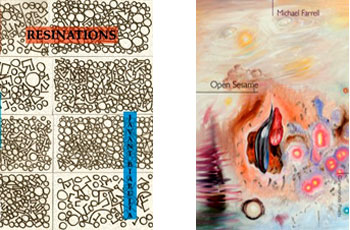
Humour Only One Impulse
Resinations by Javant Biarujia
Otoliths, 2012
open sesame by Michael Farrell
Giramondo, 2012
‘Milkinghoneybeaverbrooker, Vee was a Vindner, Sower Rapes, Armenian Atrocity, Sickfish Bellyup, Edomite, Man Devoyd of the Commoner Characteristics of an Irish Nature, Bad Humborg, Hraabhraab, Coocoohandler, Dirt, Miching Daddy, Born Burst Feet Foremost, Woolworth’s Worst, Easyathic Phallusaphist, Guiltypig’s Bastard, Fast in the Barrell, Boose in the Bed, Mister Fatmate’ – James Joyce
Fans of lists in Finnegans Wake will appreciate Javant Biarujia’s new book of poetry, Resinations. Many of the most amusing juxtapositions in the volume derive from the arrangement of proper names, drawn from (most) high and (very) low cultural references presented as cubistic materials in simultaneity. Biarujia’s skill as an ‘arranger’ is deliberately Joycean, especially in his use of punning as a device to pursue slippages across related signifiers. These can follow from consonantal relationships (‘gallovidian galloway galoot’), etymological homologies (‘Empedocles (another Pete!’)), or from what Kandinsky called – rather obscurely – the ‘inner klang’ of words (‘Myrrhder the Myrrhderer’). Every line demonstrates a bristling attentiveness to sound and connotative overtones – this commences with the gorgeous titles drawn from a table of ‘resins’: so the word ‘Tacamahac’ naturally suggests a poem about tennis, its epigraph suitably derived from John Ashbery’s OuLiPian ‘Tennis Court Oath’.
Since Ashbery’s 1962 experiments, however, computers have made procedural techniques of aleatory composition seem slightly redundant. Pass Aretino’s Erotic Sonnets through Google Translate a couple of times for instant smutty entertainment; watch Preminger’s Fallen Angel on YouTube with automatically-generated captions: Linda Darnell never sounded so hypnagogic. There is a sidelong reference here to ‘deus ex Googlaas search engines’, but Biarujia’s sculptural control of his verbal materials is never in question. The comment in ‘Labdanum’, ‘all pastiche and no parono-/masia makes the past a dull Lautréamont’, seems a suitable statement of intention, as well as a swipe at less critically and linguistically adept pasticheurs and purloiners. If poetry is always a navigation between twinned polarities of ‘mastery’ and ‘chance’, as Mallarmé suggested, Biarujia’s techniques of organisation mean that his poetry is never engulfed by ‘le hasard’ and maintains a strict formal mastery.
In fact these eight-line poems seem exactly the right length for the performances they encapsulate: each contains no more than fifty words deftly placed for maximum paronomasic ‘resonance’. Paronomasia, incidentally, is the rhetorical term for playing on words with similar sounds, a special concern of Gerard Manley Hopkins and the Russian Velimir Khlebnikov, as well as recent U.S. poets such as Jackson Mac Low – each of whom (along with Stein and Joyce) is an important precursor to Biarujia’s experimental practice. This also defines the main function of poetry: its employment of prosodic devices to reshape and refresh the habitualised conventions of language, and beyond this to renew our perception of the world itself.
Resinations employs traditional devices such as end-rhyme – ‘Matsuyani’ plays on the inconsistent French and English soundings of words ending in ‘ez’, concluding with a correction of the common mispronunciation of ‘Rodez’, the scene of Antonin Artaud’s most glossolalic utterances – as well as a scintillant variety of far more musicalised approaches to sound-patterning across phonemes. This extreme attention to formal elements doesn’t, however, entail any avoidance of direct representation: overtly political references and anti-war poems are a feature of the volume. Here, for example, is ‘Storax’:
rub-a-dub-dub rataplan tat-tat-tat-boom-boom! heroes gonna see some actshun in dem dar rooins invade I-rack ll free dem heejahbee jeebees rub-a-dub-dub rataplan tat-tat-tat-boom-boom! tahm fern eye fern eye morn jussa dram o muscle rub-a-dub-dub rataplan tat-tat-tat-boom-boom! put a stopt dem muzzled mens darins-&-doins rub-a-dub-dub rataplan tat-tat-tat-boom-boom!
The central metaphor throughout is that of varnishing (all those resins creating resonances): the suggested paradox is that only through an apparent concentration on surface, the deceptively autonomous initiative of words themselves, are we led to new recognition of the world around us.
Javant Biarujia’s writing has been widely anthologised, shortlisted for national awards, and has received significant international attention from Charles Bernstein and Richard Kostelanetz amongst others. His 2007 new and selected volume, pointcounterpoint, seemed mostly overlooked (possibly for reasons of distribution), yet it was undoubtedly one of the major works in Australian poetry from the past few years. Along with figures such as Chris Edwards, Pete Spence, Chris Mann and Amanda Stewart, Biarujia is an influential and central presence in local innovative writing. Resinations can be ordered through Lulu: don’t expect to find it in your local shop.













